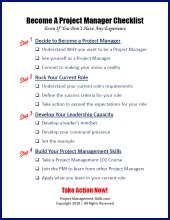Avoid Project Management Failure
Tips for Achieving Project Management Success
 Project Management Failure Avoided!
Project Management Failure Avoided!Project management failure is something we all want to avoid.
We all want our projects to be delivered on time, on budget, and meet the agreed upon requirements. Just as important, we want our projects to achieve the business value they were intended for in the first place.
However, over the life of your project, there are hundreds, if not thousands, of things that can nudge your project in the wrong direction and eventually lead to project failure.
Fortunately, there are some actions you can take to prevent and deal with these negative influences.
Here are three tips that you can use to achieve project management success.
Define Project Success
Have you agreed with your key project stakeholders what success looks like for YOUR project?
A critical part of project definition is defining what the Critical Success Factors are for your project. Not only do the project success factors need to be defined, but they need to be agreed with your key stakeholders.
Critical Success Factors are the criteria that must be met for the project to be considered a success. These criteria should be driven by the business value the project is intended to achieve. The criteria may also include the triple constraint elements of cost, schedule, and scope. But these may just as likely be excluded.
If you don't take the time early in the project to define and agree with your key stakeholders what project success looks like, you're setting yourself up for project management failure.
Plan Your Project
You may be so excited about your project that you are tempted to jump right in and get started. Or maybe your project is so urgent you feel you don't have time to spend on planning.
Failing to plan is an almost guaranteed way to make sure your project fails!
Don't fall into this trap.
In fact, you need to plan your project on two levels.
First, you need to plan your project's strategy and then you need to plan your project's implementation.
Strategy planning is simply planning the approach your project will take. Think of this as your project's "game plan."
For example, if you are responsible for deploying a new process for your company, will you have local training sessions, virtual training sessions, or self-learning using prerecorded material?
Don't gloss-over the selection of your project strategy. Your decision will impact everything else on the project.
Implementation planning is where you define HOW you will implement your project strategy.
This is the detailed planning where you work out all of the details about what needs to be done, who will do it, how it will be done, how long it will take, and so on.
Thorough planning of your project will significantly increase your project's probability of success and avoid project management failure.
Track Your Project's Progress
Once your project planning is complete, you will begin the execution phase of the project management life cycle. During this phase, systematically tracking your project's progress and comparing it to your plan is critical for ensuring it stays on track.
To measure your project's progress, you need to know two things...
- Where your project is supposed to be
- Where your project actually is
The first step to controlling your project is to have a plan. The plan is what tells you where your project should be at any given time.
The second step to controlling your project is to determine where your project is at this moment. To really know the status of your project you need to know if the work is on schedule, how much costs have been incurred, and how much of the planned work has been completed.
It's important to understand that you can't get an accurate measure of your project's progress by only looking at whether your project is on schedule. You need to consider all three elements of schedule, cost and scope. One of the best methods for doing that is the Earned Value Management System.
Tracking your project's progress using a system such as Earned Value Management will reduce the chance of project failure.
In Conclusion...
If you take the time to...
- Agree on your project's Critical Success Factors with key stakeholders
- Perform both strategic and implementation planning
- Track your project's progress using a system such as Earned Value Management
... you will have taken some key actions that will help you avoid project management failure.
Related Articles About Project Management Failure
These project management principles will help you build a strong foundation from which to manage your projects. Learn how you can use these fundamentals to ensure your projects succeed.
What is project management? Going beyond your typical definition of project management, find out why project management is exhilarating, challenging, and inspiring.
The Project Management Life Cycle
The project management life cycle provides a framework for managing any type of project. From Project Initiation to Project Closure, learn the key aspects about each phase of the project life cycle.
Project Manager Duties and Responsibilities
Understanding key project manager duties will help you lead your projects successfully. Using the four functions of management, learn about the main responsibilities and duties of a project manager.
Organizational Structure Types for Project Managers
Learn how organizational structure types can affect how you manage your project.
Do You Want More Project Management Tips?

Subscribe to Project Success Tips, my FREE Project Management Newsletter where I share tips and techniques that you can use to get your Project Management Career off to a great start.
As a BONUS for signing up, you'll receive access to my Subscribers Only Download Page! This is where you can download my "Become A Project Manager Checklist" and other project management templates.
Don't wait...
New! Comments
Have your say about what you just read! Leave me a comment in the box below.